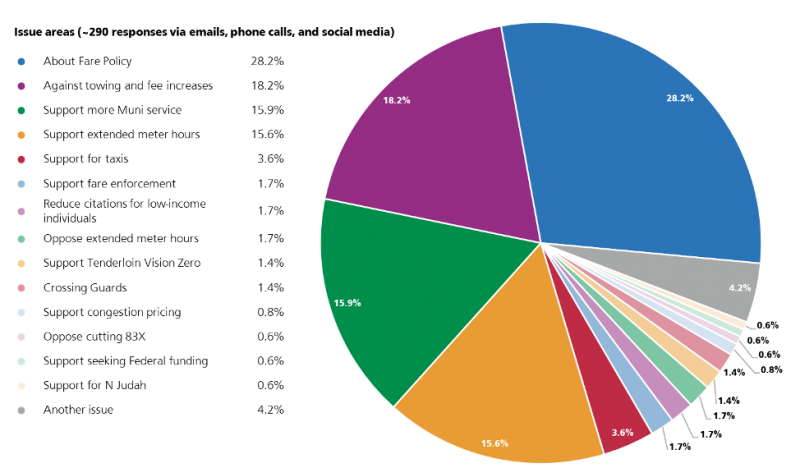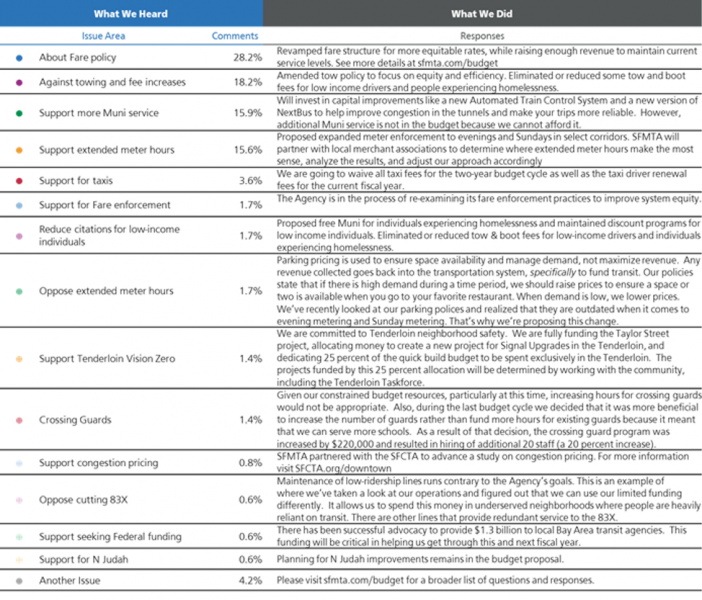By
This is the fourth in a series of blogs exploring the San Francisco Municipal Transportation Agency’s (SFMTA’s) budget process and proposal for Fiscal Years 2021-2022. The first blog provided a high-level overview of the budget process, the second discussed our projected revenue and expenditures and how they inform budget development, and the third presented a deep-dive into our policy objectives and funding priorities. This post will discuss on overview of the outreach process for the Fiscal Years 2021-2022 Consolidated Budget. Please stay tuned for future posts in this series.
Introduction
The SFMTA’s work impacts the lives of everyone that sets foot in San Francisco, connecting individuals to work, school, healthcare, and other essential services by foot, wheelchair, bike, paratransit, and public transit. Our policies, services, and projects affect the lives of workers, residents, and visitors throughout the city. The Consolidated Budget reflects our values and lays out the path the SFMTA will take towards fulfilling its mission to connect San Francisco through a safe, equitable, and sustainable transportation system. Engaging the public and incorporating their perspectives in the Budget, and all of our work, is necessary to fulfill this mission.
The development of the proposed FY 2021-22 Consolidated Budget included a public outreach and engagement process. We designed the outreach and engagement process to ensure that SFMTA’s stakeholders are fully informed and their feedback is carefully considered as the agency develops the Budget. The public outreach and engagement plan included meetings with elected officials, neighborhood groups, community organizations, citizens’ advisory councils, and partner agencies. A list of organizations that we met with is presented at the end of this blog.
The Consolidated Budget outreach planning and implementation began in January and ends April 21st when the SFMTA Board is presented with the final budget. It’s important to note that SFMTA staff learns about community needs in the years between budget cycles through surveys, SFMTA committees, advocacy and community groups, and project-specific outreach. These learnings informed budget proposals and decisions. Below are the highlights of the outreach schedule:
Public Outreach & Engagement Schedule
|
Activities/Tasks |
|
|
1/28/2020 |
|
|
Feb/Mar 2020 |
Reached out to and met with District stakeholders and Supervisors. |
|
2/12/2020 |
Posting of notices in SFMTA vehicles |
|
2/14/2020 |
Posting of Facebook events and related advertisements |
|
2/18/2020 |
|
|
Feb/Mar 2020 |
Publication of advertisements in citywide and neighborhood newspapers |
|
3/3/2020 |
|
|
3/17/2020 |
SFMTA Board of Directors Presentation – Updated Consolidated Budget |
|
4/2/2020 |
Online Conversation with Jeff Tumlin, SFMTA Director of Transportation |
|
4/7/2020 |
|
|
4/21/2020 |
SFMTA Board of Directors Presentation and Vote on the Consolidated Budget |
In January 2020, SFMTA staff hosted an all-day budget workshop for the SFMTA Board of Directors which outlined the budget landscape and proposed a roadmap to achieving a balanced and sustainable budget. At the budget workshop staff presented possible funding priorities (i.e. additional Transit Operators, ect.), and policy objectives (i.e. fare policy, ect.). This workshop was also the first opportunity for public comment on budget proposals.
Following the workshop, the Agency launched a series of public workshops and online discussions to share proposed budget decisions and gather valuable feedback to further refine the budget. We emailed 1,024 community stakeholders in each district to offer the opportunity to meet with SFMTA staff and ask questions or offer feedback on the balanced budget proposals presented at the Board of Directors workshop. We met with every group that responded, and a complete list of participating community partners can be found at the end of this blog.
As the community engagement process continued to shape the budget, COVID-19 emerged as a serious threat to public health and major disruption to the way of life in San Francisco. The financial impacts of the first weeks of the public health emergency drastically reshaped the Agency’s understanding of and projections for the budget.
Despite the challenges created by COVID-19, we were committed to continuing our dialogue with the public. The SFMTA moved the series of planned public meetings and workshops to a virtual space. Members of the public could participate in live conversations via social media accounts (twitter, Facebook, YouTube), via email, and via telephone. Recordings of both the Virtual Budget Open House (3/19) and the Online Conversation with SFMTA Director of Transportation (4/2) are available on the SFMTA YouTube page.
Outreach responses
During our outreach and engagement process, we received hundreds of postcards, voicemail messages, emails, and mentions on our social media accounts with valuable feedback on our consolidated budget proposal. The issues that we heard the most about included fare policy (28.2%), advocating against increasing towing and fees (18.2%), support for more Muni service (15.9%), support for extended meters (15.6%), and support for taxis (3.6%); see pie chart below. The Agency put together a FAQ to answer many of the questions that we heard most throughout the outreach process.

Accessible text version of graphic #1
This feedback informed several key decisions in the proposed budget including addressing equity concerns related to the fare proposal and the tow fees, providing support for the taxi industry, proposing extending parking meter hours, allocating funds to Vision Zero projects in the Tenderloin, increasing fines on safety violations such as parking in a bike lane, etc.. Stakeholder input and discussion informed many of the final Consolidated Budget decisions.
The table below provides a short summary of how the Agency addressed community feedback. More detailed feedback and also be found in the FAQ.

Accessible text for graphic #2
Acknowledgements
We at the SFMTA want to thank you all for your invaluable input. You truly helped to shape the budget we will bring to our Board of Directors on April 21st. The Agency recognizes that we must work to continuously improve our outreach process. We will assess the success of the budget outreach process and welcome your feedback, which you can submit to sfmtabudget@sfmta.com.
Participating Community Partners
|
SFMTA Citizens Advisory Council |
|
Small Business Commission |
|
San Francisco Youth Commission |
|
San Francisco Transit Riders |
|
Budget Digital Town Hall |
|
Paratransit Coordinating Committee |
|
South of Market Community Action Network (SOMCAN) |
|
Market and Octavia Citizens Advisory Council |
|
Chinatown Community Development Corp TRIP |
|
SF Building Owners and Managers Association (BOMA) |
|
SF Chamber of Commerce |
|
SF Council of District Merchants |
|
SF Travel |
|
Young Women’s Freedom Center |
|
Community Housing Partnership |
|
SF Rising |
Published April 21, 2020 at 07:37PM
https://ift.tt/2yw0k4v
Comments
Post a Comment